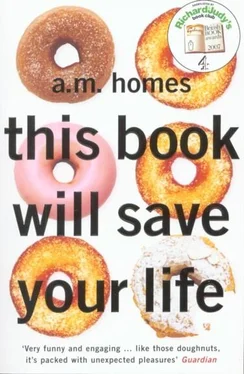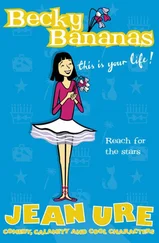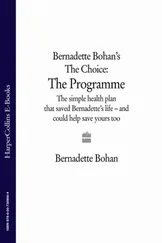"Where to?" he asks, starting up.
"You can just drop me at Fairfax."
"You should take tomorrow," he says, "the whole rest of the week, really — paid, of course. There's not much to do at the moment. I'll check on the house again tomorrow."
Cecelia nods. "I appreciate that… and the headphones. If you need something, or you get yourself into trouble, call me. It's not so far. I can come."
"Have a good afternoon," he says when she gets out of the car. Have a good afternoon, why did he say that? It's not exactly warm and friendly. It's something you say to the guy at the gas station after you sign your credit-card slip. It's something you say to someone you care nothing about — have a good afternoon. He's known Cecelia for as long as he's been in L.A. — she was recommended by a business connection who could see that, as a newly single fellow and a greenie in town, he was going to need some special attention. She started off working two days a week, and within a couple of months was full-time. It wasn't that he needed so much looking after, it was that he liked having her around.
HE PULLS INTO the driveway of the Four Seasons.
"Luggage, sir?"
"Just what's in the car."
"The suitcase, sir?"
"Yes, the suitcase, the laptop, the grocery bags, everything, everything in the car is coming up with me. There's a painting in the trunk; you'll need an extra man — someone very careful, if you don't mind."
Richard takes the de Kooning under his arm.
She is in the lobby, waiting. "You're not going to rape me, are you?"
"I wasn't planning on it. I've got a lot of fish with me and I need to make sure that it goes into a refrigerator." He motions towards the luggage trolley that's coming through the front door with the contents of his car piled onto it. Behind the trolley, a bellhop carries the Rothko painting — holding it out in front like a shield.
"I've never met a man at a hotel," she says.
"Do you have any luggage?" he asks.
"Just this bag," she says, patting her purse, which is enormous. It could double as a file cabinet, a walk-in closet.
"Car, sir?"
"Yes," he says. "I left it with the man outside."
"I'll just get someone to show you to the room."
"How's your leg?" she asks in the elevator.
"Fine," he says. "There's a bruise, a big green bruise."
He feels like Ben in the film The Graduate, checking into a hotel, riding up in an elevator with a woman he hardly knows.
"It's so strange," he says. "We named our son Ben after Ben in The Graduate. 'Plastics. There's a great future in plastics. Think about it,' " Richard quotes the film. "My ex-wife was my own personal Elaine. I was crazy about her."
The bellman opens the door and leads them into a two-bedroom suite. Is this his wife's usual room — or have they given him/her an upgrade of sorts? Does she travel with an assistant, or is the second room in case Ben wants to come at the last minute?
"It's nicer than my house, nicer than where we went on our honeymoon."
"Where do you live?"
"Hancock Park — it's perfectly fine, totally normal except for me."
"Will you be needing the treadmill, sir?"
"Not this time, thanks."
Richard sits the de Kooning on a chair and props the Rothko against the wall.
"Are you sure about the treadmill? We usually deliver it ahead, it goes in the second bedroom, but there was very little time to prepare."
"All right, fine, put it in the bedroom. And a fridge — I'll need a fridge."
"There's one in the kitchen. Shall I put the groceries away?"
"Shall I" — where is this guy from? Most people can't speak English at all, and not only does he speak it, but he "shall I" s.
"Yes, that would be lovely."
"Is everything satisfactory?" the man asks while he's putting the groceries away.
"Yes." Richard has never said yes so many times.
"How much is this room?" she asks.
"The rate card is posted in the closet, along with information about the hotel, fire and earthquake safety, and your in-room safe."
The crying woman looks in the closet. "Sixteen hundred ninety-four dollars a night," she whispers.
"I'm sure I'm not really paying that," he says.
"Is there anything else I can do?" the bellman asks.
"No, thank you, you're wonderful, we're fine," Richard says, validating everyone and handing the man some money.
It's late afternoon. The day is nearly over and he's spent most of it adjusting, transiting, transitioning. He feels out of order. Richard goes to the window; the view is of a particular kind of L.A. stillness, smog, haze, a timeless, frozen quality. You can't tell what time of day it is by looking out; you have to look at your watch.
He and the crying woman sit on the sofa, facing the television, which is tuned to Headline News — sound off. When you look at it carefully the room is ugly, faux fancy but boring. Everything is sturdy, durable, banal, bland, no personality, no character — it just is. All of the furniture has rounded edges — is that a safety issue, so sleepwalkers don't stab themselves, or would you call it a style point? He wants there to be something annoying about the room — some jarring chintz, vibrating striped wallpaper, a clash between bedspread and carpet — he wants something to be annoyed about.
The doorbell rings; a plate of fruit and some bottles of still water, "compliments of the manager."
"Do you stay here often?" she asks.
"No," he says, "never. My wife, my ex-wife, stays here; that's why they're trying so hard. She eats fruit and drinks a lot of water."
"The first time I stayed in a hotel it was with a man I worked for — my boss. We shared a room. I couldn't decide if I could put my hair in curlers, the way I usually did, or what. So I put my hair up, covered it with a shower cap, and went to sleep with the shower cap on. In the middle of the night, I got up to pee and fell into the toilet — he'd left the seat up. He called out, 'Honey, you all right?' I said, 'I'm fine, dear, go back to sleep,' and in the morning there was no mention of it. Can you imagine me with my hair up in curlers?"
He looks at her — he can. He says nothing; it's not the kind of question you're supposed to answer. "So what happened?"
"When?"
"Now, today."
"Do I have to tell you?"
"No."
"I started wishing I was dead. Yesterday I spent five hours in the car, picking them up, dropping them off, driving in circles, making sure I had their water, snacks, their sports equipment, circling home to wash their clothes, to walk the dog. I got in at six, cooked dinner, and they said, 'We don't like meatloaf,' and I said, 'It's chicken,' and they said, 'We don't like chicken.' It's like I'm their servant. No one says thank you or puts their dishes in the dishwasher or lifts a finger."
"And why don't you say anything?"
"I'm afraid. If I say something, I won't just say something — I'll explode. I'll pick up my son's baseball bat, which is under the kitchen table, where he left it, and I'll start smashing them in the head, I'll club them to death. I don't trust myself."
He looks up at the clock on the television. "Excuse me for one minute. I need to make a couple of calls."
"I hope I didn't scare you," she says.
"Scare me? No, you didn't scare me, I just have to call the insurance company and let them know where I am."
"I was wrong," Paul the stoner says. "I don't know what I was thinking — a sinkhole is not covered, no coverage at all; earthquake, you're all set. Frankly, I would never have known there was a difference, but after you called I looked it up; I'm quite sure now that despite everything, you are not covered in any way, shape, or form."
"Not covered at all?"
"That's right."
Читать дальше












